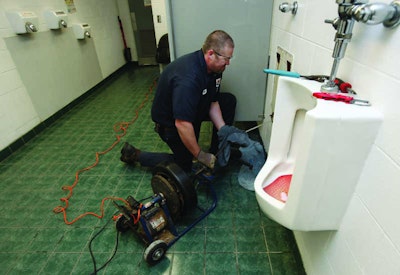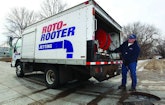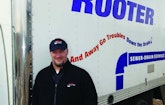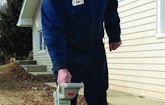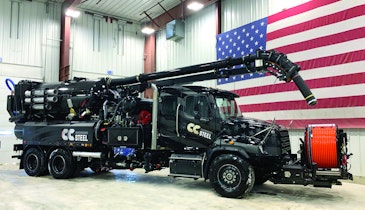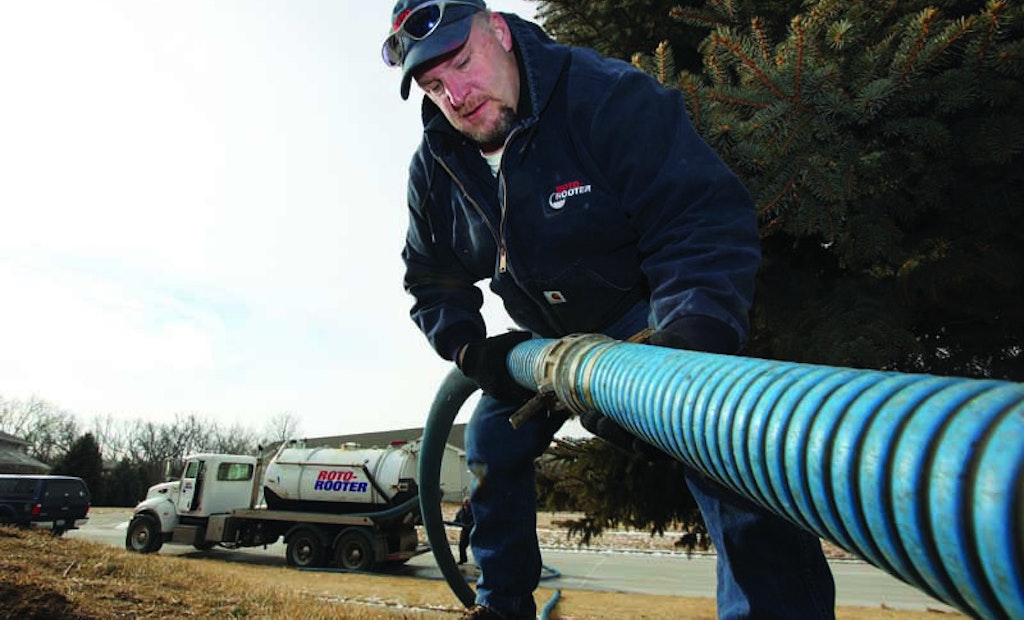
Interested in Location/Detection?
Get Location/Detection articles, news and videos right in your inbox! Sign up now.
Location/Detection + Get AlertsPat Brown had industry experience, but he’d never owned a business or even worked as a drain cleaner. He served as national sales representative for the Roto-Rooter Corporation in the 1990s, then spent two years with Vermeer before deciding it was time to buy his own Roto-Rooter franchise.
Brown graduated college in 1990 with a degree in mass communications, but quickly realized he preferred plumbing to broadcasting. He went to work at the Roto-Rooter headquarters in Des Moines, Iowa, in 1995, and four years later moved on to Vermeer, where his responsibilities included training technicians how to use new industry technology.
In his travels, Brown had become acquainted with the owners of Roto-Rooter of Sioux City. When he was ready to make the transition, he picked up the phone and asked if they were interested in selling, and the conversation began.
That was in 2001. The franchise was pretty basic, offering primarily drain cleaning. Brown wasn’t satisfied with the limited menu of services, and quickly tired of sending work to other contractors. He believed there was ample opportunity to expand services and grow the customer base.
“We would identify the problem and then tell the customer they needed to call somebody else,” Brown says. “I thought that was foolish.”
Tri-state certification
By the time 2014 rolled around, he had his underground contractor license (2004), his master plumber license (2009), and was licensed as a septic installer in three states. Sioux City has some hard and fast regulations regarding wastewater infrastructure, and new technologies such as pipe bursting and relining are not permitted. The primarily clay and cast-iron pipe in older systems must be replaced with the same pipe. Newer neighborhoods with PVC lines rarely experience problems.
In Iowa, Brown does underground work, water, sewer and septic, as well as plumbing, drain cleaning, CCTV inspections and jetting. In Nebraska, he does underground work, septic installation, as well as CCTV inspections, jetting, drain cleaning and plumbing. In South Dakota, the company does septic installation, drain cleaning, CCTV inspections and jetting, but no plumbing.
When hydroexcavation gained popularity, Brown invested in a hydroexcavator from Vac-Con and began serving the growing market. Combined with the other services, it has provided a comfortable niche in the territory.
The Roto-Rooter franchise had been in the neighborhood for over 60 years, and in order to convey his story and all the new services the business had to offer, Brown turned to television advertising. He appeared in or narrated many of the spots, which often featured technicians at work. Customers got the message, and they came to recognize the technicians – and sometimes Brown himself – when they showed up at their doors.
Brown says he budgets around $50,000 each year for his promotional efforts.
Opportunity abounds
Finding qualified technicians who understand the job is a challenge for Brown. New hires train for two to eight weeks alongside a service manager.
“There are three things I stress in hiring,” he says. “The first two are that this requires hard work and long hours. The third is that I pay very well. When it comes to weekend and overnight work they tend to forget the first two things and why I hired them.
“We don’t have a large population to pull from, and we have attrition. People who have been in the industry and have the knowledge are no longer with us. Back in the 1990s, I would talk to service technicians in my other job and say that they can control how much money can be made. Being on call is part of the whole thing – where the financial advantage can be. In our shop with a small force we try to have each tech take one weekend a month, which greatly enhances their take-home pay.”
Technicians can park their service vans at their facility, or take them home, which is an added perk.
Established knowledge base
Service manager Paul Crow oversees industrial cleaning, vacuum pumping and all underground work.
“The smartest thing I did when I bought this franchise was keep Paul Crow on staff,” Brown says. “When you buy an existing business, you can sell off equipment and buy new, you can hire new staff, bring others on board. Paul can fix anything. He can open any drain. Keeping him with all that knowledge was the main reason we survived as a company. You need someone who has seen it all. His knowledge, work ethic and customer service skills make him the gold standard and an inspiration to all other techs.”
Crow has a long history and heritage with Roto-Rooter, from his great-grandfather Harry “Tuck” Fisher who was a franchise owner in Burlington, Iowa, and then working for his grandfather Gerald Fisher in that Roto-Rooter franchise, and finally for his uncle Tom Fisher, who owned Roto-Rooter of Sioux City.
“Paul also designed and built our in-house 2009 Peterbilt pump truck, from chassis to finished product,” Brown says. He became a licensed septic inspector for the state of Iowa in 2010 and became NASSCO PACP certified in 2013.
Kyle Streeter, who oversees the drain technicians, and journeyman Joe Drake, both of whom have been with the company several years, are also key members of the staff.
One-stop shop
Brown finds that customers – an even mix of residential and commercial/industrial clients – appreciate and are more comfortable dealing with a single entity for multiple needs. Many times they are not sure whom to call to solve a problem, and often an initial call to solve a particular issue will lead to something else. If a mainline is plugged, they go to open it up. They may put the camera in to locate the problem and discover a repair or replacement is necessary.
A rural customer may call about a septic system with a tank that isn’t draining, and then call again two weeks later with the same issue. Upon returning they may find the leachfield needs attention, which they can handle in-house.
“Customers learn the problem, then have to decide if they will fix it or live with it,” Brown says.
A recent contract with Sioux City involved televising and inspecting storm drains running through the town and under Interstate 29 prior to scheduled repair work and resurfacing.
The CCTV equipment is an important asset. There is an extra charge to the customer, but service technicians only suggest it when it is obvious they need to show the customer what is actually going on. He says they use the cameras on about 25 percent of their jobs.
Cameras are maintained at the office, and when called for the technicians will check out the equipment for that specific job, which helps avoid accidental damage. Otherwise, service vans are fully stocked.
Crow heads a three-man crew that runs their jetters. They’re in service every day, and like the cameras, are a vital part of the business.
“The bottom line is we want to offer everything from A to Z for our customers,” Brown says.
Bellwether boost
Roto-Rooter of Sioux City hits the road with five Chevrolet 3/4-ton vans, a 2006 E-250 Ford and a 2008 Ford F-450 dually for plumbing/excavation. The 2,000 psi/80 gpm Vac-Con sits on a 2002 International 9400 chassis with a 12-yard debris body.
Cameras include a Pearpoint P494 and five RIDGID SeeSnake inspection cameras, all equipped with 512 Hz sondes for pipe locating. There are also two Radiodetection pipe locators, an RD7000 and RD4000.
When it’s time to jet out a line, the company relies on a 2003 US Jetting 4018-300 trailer jetter mounted on a 2003 Isuzu NPR, and a 1998 4,000 psi/18 gpm PipeHunter Boss mounted on a 1998 GMC W-4500. Additional equipment includes a Kubota U45R excavator and a 2004 Bobcat T190 skid-steer, along with Roto-Rooter machines and equipment from Vermeer for underground water lines.
The company has two lots in an industrial area of town, and their facility includes a 7,000-square-foot garage. One section is heated to house equipment, and the other includes office space and an area to park service vans.
While the company has grown over the past 13 years, Brown believes there is always more to gain.
“We are still striving,” he says. “You have to move ahead, or you are dying. We always have to look for the next equipment that emerges. We need to service our marketplace. And we have competitors, no question about that. Since 2001, we have attended the Pumper Show [Pumper & Cleaner Environmental Expo International], which has been beneficial for us. We are always looking for avenues that will increase our revenue.”
